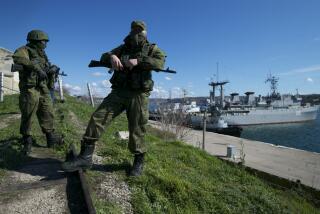Crimea OKs Constitution Declaring Its Independence From Ukraine : Black Sea: Kiev proclaims the vote invalid and issues an ultimatum. Observers worry the clash may turn explosive.
- Share via
KIEV, Ukraine — The defiant Parliament of Crimea set out on a perilous confrontation course with Kiev on Friday by adopting a constitution that in effect declares the restive Black Sea peninsula independent from Ukraine.
Ukrainian President Leonid Kravchuk retaliated by asking Ukrainian lawmakers to proclaim the Crimean vote invalid. They promptly issued an ultimatum to Crimea to suspend its decision or face unspecified consequences.
Ukrainian Defense Minister Vitaly Radetsky warned that “Crimea is part of Ukraine and we won’t give it up to anyone, no matter what it may cost us. Everyone should know that.”
Western and Russian observers worried aloud Friday that the fight threatened to turn explosive.
One diplomat in Kiev commented that “the only way Ukraine can stop (the Crimeans) is with the use of police power, and that runs the risk of confrontation.”
Jubilant Crimean deputies applauded and hugged each other after an overwhelming majority of 69 out of 73 present approved the bill restoring a 1992 constitution, which puts Crimea’s relations with Ukraine on a foreign footing.
Toward evening they went a step further by considering an appeal to Moscow and Kiev to allow Crimea to move toward rejoining Russia, the Interfax news agency reported.
A worried group of dissidents in the Crimean Parliament warned that the vote on the constitution would lead to violence.
“I am very afraid,” said Lila Budzhurova, an ethnic Tatar. “This vote has put Crimea on the verge of civil war.”
The Crimean peninsula was part of Russia until 1954, when the Soviet leadership made it part of Ukraine, which was then one of 15 republics making up the Soviet Union.
About 65% of Crimea’s 2.5 million people are ethnic Russians. Most of the rest are Ukrainians. Tatars, who commemorated the 50th anniversary of their Stalin-era deportation from the peninsula this week, number only 200,000 but wield disproportionate political clout.
Earlier this week, Kravchuk cautioned Crimean lawmakers that they were going too far, and he showed some muscle Thursday by taking over Crimea’s Interior Ministry, which directs its police force.
In Moscow, Russian President Boris N. Yeltsin said he had warned Kravchuk not to resort to force against Crimea. He said Kravchuk had assured him that Kiev would stick to peaceful means.
But Russian television reports of commandos parachuting into Simferopol and tanks rumbling along Crimea’s main roads, though angrily denied by Ukrainian officials, added to the sense of threat over the peninsula. Even Crimea’s separatist new president, Yuri Meshkov, asked the lawmakers, most of whom won March elections on pro-Russian platforms, to put off the vote, at least for now.
However, the normally supportive Crimean deputies defied their own president by going ahead with the vote.
They also passed a law requiring Crimean draftees into the Ukrainian army to serve exclusively on the peninsula.
“We have no reason to fear Ukraine,” declared Alexander Kruglov, a vehemently anti-Ukrainian deputy from Sevastopol, to his colleagues. “There are 80,000 Russian Cossacks ready to defend Crimea.”
While Kruglov’s numbers may be exaggerated, the involvement of any Russian paramilitary troops in Crimea would escalate the conflict.
“This will not only lead to a conflict between Ukraine, Crimea and Russia, it will lead to civil war here,” Budzhurova said.
In May, 1992, Russia’s previous Parliament questioned the legality of Crimea’s 1954 transfer from Russia to Ukraine, thus emboldening its Crimean counterpart to declare independence and adopt a separatist constitution that declared Ukraine a foreign country and provided for Crimean citizenship and its own armed forces.
That constitution, along with the declaration of independence, was withdrawn after Kiev issued an ultimatum. But the March elections produced a pro-Russian Parliament far less willing to back down.
More to Read
Sign up for Essential California
The most important California stories and recommendations in your inbox every morning.
You may occasionally receive promotional content from the Los Angeles Times.













